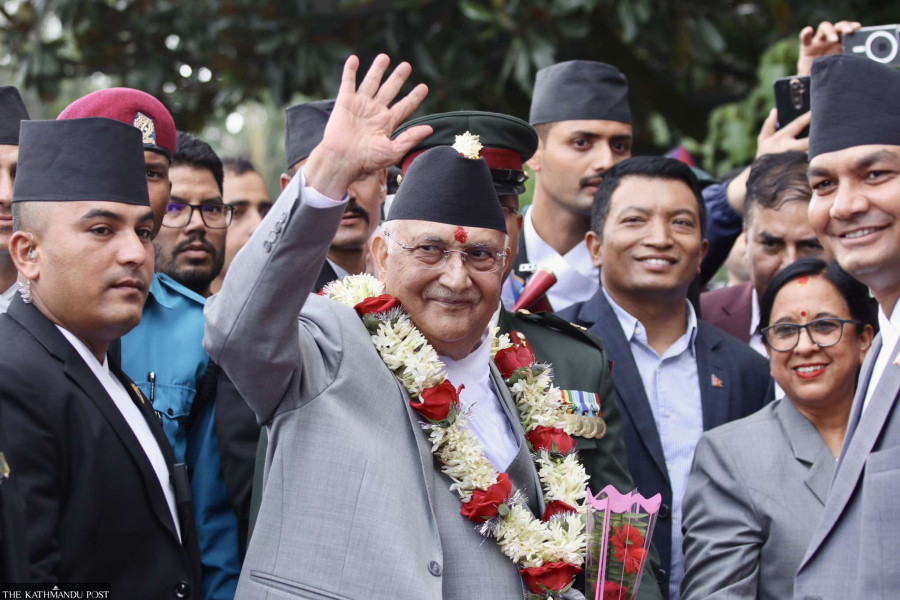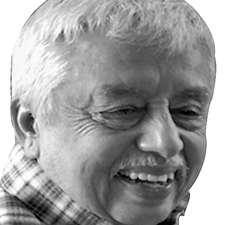Columns
Oli: New versus old
More disappointments are on the way. Or will there be a collective explosion of people’s anger?
Naresh Koirala
Khadga Prashad Oli, President of the CPN (UML), returned as Prime Minister for the fourth time. His unexpected decision to walk out of his four-month-old deal with Pushpa Kamal Dahal, Chair of the Maoist Centre, and to form a new alliance with Sher Bahadur Deuba, President of the Nepali Congress (NC), precipitated Dahal’s fall and Oli's ascendancy.
No political party commands a majority in the parliament. The support of a majority of members of the parliament is necessary to be elected as Prime Minister, thus making some form of alliance between parties essential to all aspirants to the post. Before the fatal deal with Oli, Dahal was in partnership with Deuba, and prior to Deuba, he was with Oli. Betrayals and making and breaking deals have become the new norm of Nepali political leaders.
The principal players in this game of musical chairs, involved in shifting alliances and betrayals, are Deuba, Oli and Dahal. Their ultimate objective is to capture the prime ministerial chair and control the government. In the last 10 years, as occasional game winners, Deuba, Prachanda and Oli have each led the country several times. Oli's victory in the latest round made him prime minister on July 15.
Kathmandu's pundits are on overdrive, trying to crystal-ball the life of the Oli-Deuba alliance, but the immediate question is how the new Oli government will perform. Will the new Oli be different from the old Oli?
The performance of previous Oli governments provides a basis for predicting the likely direction of the new Oli government, but more is needed. The prediction will only be credible if it considers the reasons for Dahal’s sudden dumping.
Dahal’s dumping
Dahal’s removal followed a secret meeting between Deuba, Arzu Deuba and Oli at the end of June in Oli's residence. This meeting is believed to have been the setting for the deal to form a new Deuba-Oli alliance and remove Dahal. The deal was announced about 24 hours after the meeting and sheepishly endorsed a couple of days later by the central committees of both the NC and the UML.
According to an NC Central Committee statement, the objectives of the new alliance are, among other things, to amend the provision of proportional parliamentary seats in the Constitution (which they argue is the reason for the instability of previous governments), to form a stable government, and to control corruption. Oli will hand over the premier seat to Deuba after 18 months.
It is disingenuous to suggest that an alliance to form a government is necessary to amend the Constitution. If they believe the amendment is required, the UML and the NC could jointly work towards it and help garner the two-thirds vote necessary to pass it.
The proposed change of prime minister halfway before the next election contradicts the objective of a stable government. Experience shows that changing prime ministers is inherently disruptive. Coalition governments govern most of continental Europe; their prime ministers do not change in the middle of an election term. India has a coalition government. Prime Minister Modi has no plans to hand over power to his coalition partners before the next election.
The NC statement is virtually silent on how political corruption, the most debilitating scourge of the Republic, will be controlled. The contradictions in the NC Central committee statement and the urgency with which Dahal was ousted have fueled several speculations on the intent of the new alliance. One gaining ground is related to the arrest of Bechan Jha, one of the principal actors in the 'Bhutani refugee scandal', a few days before the Deuba couple met with Oli. The Deubas were distraught that Jha may have evidence implicating Arzu Deuba in the scandal. Jha was arrested on orders from Dahal’s Home Minister, Rabi Lamichhane.
The arrest of Jha alarmed the NC and led to persistent criticism of Lamichhane for his involvement in the cooperative's financial scandals. Demonstrating that he had not compromised the RSP's mission to investigate all significant corruption cases had become an existential necessity to Lamichhane and his party. In this context, Lamichanne had ordered Jha's arrest and threatened to reopen other corruption files that the previous Oli and Deuba governments had buried.
If carried to their logical conclusion, the investigations on these files could implicate senior leaders of all the major parties. Stifling these investigations and getting rid of Dahal urgently before Lamichanne became too aggressive was in Deuba's and Oli's interests. That is why Oli-Deuba acted, the theory goes.
The new Oli
Without an official explanation of the reasons for Prachanda's coup-like overthrow, Oli's previous performances and recent cabinet appointments are the only objective indicators available to predict the new Oli government's likely direction.
Three years ago, Oli led a government with support from two-thirds of the parliament's members. It was a powerful government that could do much good for the country. At the time, Oli and Prachanda were allies. In the two and a half years he was prime minister, he concentrated the power of the government in his office and packed every organ of the government, including constitutional bodies and educational institutions, with his lackeys. Policy-level corruption in the country peaked during this period. It is difficult to think of anything memorable he did to improve governance and to control burgeoning corruption. It was a period of squandered opportunity.
Oli's new government also has the support of nearly two-thirds of parliament members. Early indications are that the new Oli will not be better than the old Oli. His new cabinet includes several people allegedly involved in unresolved corruption rackets. Within less than two weeks of taking the oath of office, his Home Minister transferred the Deputy Inspector General of police, well known for his courageous investigation of political corruption, including the Bhutanese Refugee Scandal, in which the NC and the UML leaders are implicated.
The ministerial appointments and the transfer of the DIG indicate that controlling political corruption is not the priority of the Oli government. Without controlling corruption, Nepal cannot and will not move ahead. Political corruption is Nepal's most debilitating scourge—it has compromised every organ of the Nepali Government—from national security to the executive to the judiciary to education and transportation.
More disappointments are on the way. Or will there be a collective explosion of people’s anger?




 18.12°C Kathmandu
18.12°C Kathmandu















